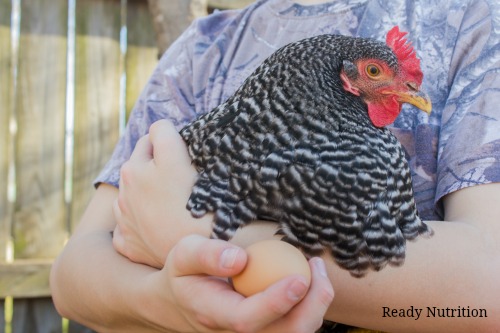
Live poultry, such as chickens, ducks, geese, and turkeys, often carry harmful germs. This year there have been several reported cases of Salmonella spreading via backyard chickens by the CDC. Eight different states are reporting Salmonella outbreaks linked to backyard chickens.
These germs naturally live in the intestines of poultry (and many other animals). Salmonella germs therefore exist in their droppings and on their bodies (feathers, feet, and beaks) even when the birds appear healthy and clean. The germs can then easily get on cages, coops, food dishes, hay, plants, and soil in the area where the birds live and roam. Germs can then pass onto the hands, shoes, and clothes of people who handle the birds or their eggs. While it usually doesn’t cause the birds to be sick or show signs of infection, Salmonella causes serious issues when it is passed on to people. It’s not a matter of keeping your chicken coops clean or purchasing “healthy” chickens. Even organically fed poultry in spotless coops can have Salmonella and there is really no way of knowing which birds have it.
(Sign up for our FREE newsletter to get the latest prepping advice, gardening secrets, homesteading tips and more delivered straight to your inbox!)
Is Salmonella Serious?
Salmonella infection is no joke: it can cause serious intestinal distress with symptoms including diarrhea, vomiting, fever, and abdominal cramping. If the symptoms are severe enough, an infected person will require hospitalization. Babies and children under the age of five, pregnant women, the elderly, and people with immune deficiencies are more likely to have serious symptoms. If the infection goes untreated, Salmonella can even spread from the intestines to the bloodstream, which leads to the infection traveling rapidly to other places in the body. A course of strong antibiotics and observation by a doctor is then necessary. In rare cases, if left untreated Salmonella can even lead to death.
How To Avoid Salmonella infection
The number one way to avoid Salmonella infection is to always wash your hands with soap and warm water after handling a chicken or anything that may have been in contact with chicken droppings. You should also cook any collected eggs thoroughly and be present when small children are around poultry to ensure they do not touch their hands to their mouths without hand washing, etc. In fact, if your children are under five years of age, they should not handle chickens or their eggs at all (the same goes for anyone over 65 or anyone with a compromised immune system).
It should go without saying, but never let the chickens into your home, especially not into your kitchen or areas where food is prepared. You also don’t want to eat or drink anything near the areas where you are minding your chicken coop. And chickens are adorable, but limit cuddling and never kiss them.
How to Treat Salmonella
If you do contract Salmonella and you are an adult with an otherwise healthy immune system, you should be fine in a week or two, though you will feel pretty miserable while the infection runs its course. (If you are in the compromised immune system category, your doctor might prescribe antibiotics and keep you in the hospital where you can be observed.) Make sure to contact your doctor if your symptoms seem to be worsening or if you have a high fever.
